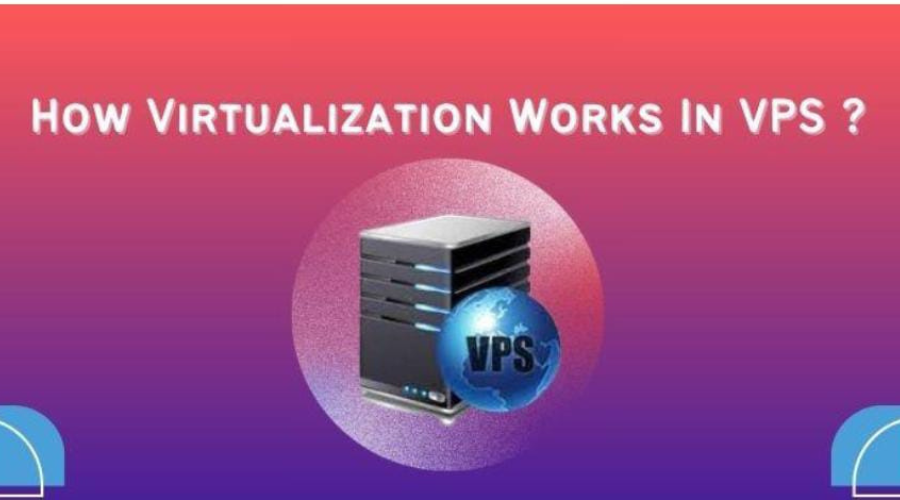
To answer the question, of how virtualization works in VPS, first, we need to have an overview of what virtualization and VPS are. VPS (virtual private server) is a sort of hosting that permits you to deploy cpanel on virtual machine, which is a product-based variant of an actual server. We go through the advantages and possible disadvantages of both virtualization and VPS.
DomainRacer and DedicatedCore VPS hosting is based on virtualization technology that is installed on a physical computer. Each high-speed VPS hosting is running with multiple operating systems (OS).
The data we produce is constantly growing. There has been a huge demand for the last two decades for a potent, fast, and cheaper solution for data storage and processing.
Of course, this entailed increased expenses in the IT department of a company and more burden on manpower. A change was inevitable. That is where virtualization technology proved to be essential and inescapable.
It facilitated the operation of many businesses and is still widely used. VPS, short for a virtual private server, is practically a virtual machine created on a physical server.
you can buy vps usa virtualization technology that provides users with greater control and customization over their hosting environment. Thanks to virtualization we can create many virtual private servers with their own distributed resources. Therefore we are capable of using a physical server’s utmost power.
What is virtualization?
Virtualization technology started in the 1960s and initially was used to divide the system resources of a computer between various applications. Due to data storage and processing demands in many business sectors.
With virtualization, we can create virtual instances over computer hardware. For instance, we can run multiple virtual machines (VMs) with their operating systems.
This means that each VM behaves as a separate computer. Besides this feature, virtualization helps to use the physical hardware resources of a computer or server more effectively.
VPS is a type of virtual machine as well. It has almost all the features of a physical server. There are a given amount of server resources (CPU, memory, storage disk, bandwidth, etc.) attributed to each VPS and can be used as full-value servers.
DomainRacer and DedicatedCore provides powerful hardware servers powered by multi-core (20 cores / 40 threads) Intel Xeon E5-2640 v4 processors. Furthermore, it helps cut back costs and save precious work time and management.
What Are The Benefits of Virtualization?
VPS services use many beneficial aspects of virtualization. The way virtualization works in VPS contributes to the improvement of productivity and business development.
Management of Applications Is Much Easier
Managing more virtual machines means managing various operating systems on the same computer. Nowadays the majority of people and businesses use different applications.
Thanks to virtualization you will be able to run different applications on one computer or server at the same time. No matter if you are a desktop user or a developer working on a desktop computer.
If you want a faster and high-speed VPS server’s technical skill to manage it, then DomainRacer’s cheap VPS security team is always in touch with you. These apps have their software (for example operating system) requirements.
You can profit from using virtualization. System administrators working with several servers can use virtualization to save time and workload. Data stored on a VM is likewise safe from the users of other VMs.
Low-Cost Solution
Before virtualization, each application needed its computer or dedicated server to complete its task. Unfortunately, this was a huge waste of money and valuable resources.
A lot of applications use only a certain percentage of total server resources. Not to mention, idle server times when the application is not running therefore the server is not performing.
Besides not investing in a lot of servers you are not responsible for buying and keeping spare hardware parts. Furthermore, you will need fewer system admins to operate and maintain the servers.
Efficient Use of Server Resources
With cost-effectiveness, we already touched upon the topic of more efficient usage of hardware resources. With virtualization technology, you can divide the resources of one server among more virtual machines.
This way you can run various operating systems on one server. Thus you can use super efficiently all the resources your server provides. This is a highly powerful tool in the computing world.
Fast Provisioning and Automation
You have to install and configure the hardware for each application which can be a time-consuming and sometimes grueling process. Now multiply this when you work with several physical servers or computers.
Virtualization enables automation of the deployment of many applications. Due to virtualization VPS provisioning for example can be lightning-fast. Besides, our VPS plans come with ready-to-use Linux distributions so you can have a running VPS within a few minutes.
Data Security
Having several virtual machines or instances on a server implies a more secure environment. Applications that run inside of a virtual machine are safe from the processes that happen in other virtual machines.
Environment and Small Business Friendly
The more servers and hardware you use, the more you have to get rid of as time passes. Decreasing the number of physical servers reduces the carbon footprint of your business. This automatically entails a reduction in power use as well.
Nowadays, responsible companies and individuals care for the environment and try to use as many green solutions in their private and professional lives as they can. Moving to virtualization takes you and your business one step closer to achieving this goal.
Additionally, the money you save using virtualization can be invested in other areas of your business development. Let’s be honest, if you have a start-up company or small business extra money to invest into or improve your biz is always gold.
What is VPS?
Before we elaborate on how virtualization works in VPS we have to clarify what VPS means. VPS or a virtual private server is a virtual machine set up on a physical server.
Practically VPS mimics a dedicated server’s environment on a single server. So a VPS provider can create multiple VPSs on one server with a hypervisor.
DomainRacer and DedicatedCore VPS hosting service with complete root access. Giving you the fastest connectivity, SSD Storage, DDR4-RAM, security, reliability with low latency infrastructure, OS installation, and server reboot.”
All these VPSs are separated from each other so VPS is a pretty secure service. Moreover, a VPS has guaranteed resources and you don’t have to share them with other users like in shared hosting.
Besides that, you can scale your VPS easily and fast whenever you need more resources. The best part is that you pay mostly for what you need. Data stored on a VM is likewise safe from the users of other VMs.
We recommend choosing VPS if your business has outgrown shared hosting solutions. It is ideal for SaaS providers and e-commerce websites. Developers who have to test applications in various operating systems also can profit from it.
Depending on what you need VPS for you can choose from multiple VPS packages in the market. The majority of VPS plans provide only 1-2 CPU cores at a very low cost combined with a decent amount of memory and storage disk
DedicatedCore offer 3 VPS plans, one with an extra number of 8 CPU cores for a smoother performance. If you look for this extra power of resource mixer. ie can help you.
How Virtualization Works in VPS?
Technically a VPS is a virtual machine. These virtual machines are built on a physical server with the help of a hypervisor. A hypervisor is software that creates a layer that abstracts the physical resources of a server from the VM that is created.
The hypervisor separates these virtual private servers from each other creating a safe environment for data storage. In a gist, this is how virtualization works in VPS. Virtual private servers have almost all the features of a dedicated server except for its price.
Above all this, virtualization brings out the most of server capacity. As a result of this, you and your business don’t have to invest in plenty of physical servers. In addition, you can also cut back sys admin costs since you will need less of them.
Popular Virtualization Platforms for VPS –
Xen
Xen is a type of virtual machine platform that allows multiple operating systems to run on the same hardware simultaneously. Ideal for application, server, and desktop virtualization infrastructures.
Pros
- It is one of the most secure solutions.
- Easy installation.
- Live patching, live migration.
- You can move a running virtual machine.
- DomainRacer allows end users to start, stop, clone, and remotely control their virtual machines.
- You can create easily clones and machine templates and then move them within the pool of hosts.
- You can move a VM from one physical server to another easily.
Cons
- It requires more frequent reboots than other competitors because the DOM kernel gets “hung up”.
- At times additional storage set up for the host seems a far more complex task to carry out than in competitors.
- Difficult to upgrade.
- The order of virtual server startup assignments is not very easy.
- Difficult disaster recovery solution.
- Once in a while, when you delete a virtual machine it can leave orphaned disks behind.
Microsoft Hyper-V
Hyper-V is a hypervisor created by Microsoft. It enables users to create virtual computer environments on a physical server. Accordingly, Hyper-V allows to run and manage various operating systems on one server as well.
Pros
- You can create so-called checkpoints, a stored version of your VM, and go back to it if a test goes wrong.
- You are capable of creating easily new virtual machines.
- Live migration is simple.
- You can back up the vhdx file.
- If you face any issues you may solve them by searching the web.
- You can control the resources.
Cons
- Unfortunately, load balancing is not available.
- It is more costly to host more than two instances on one physical server due to the new MS licensing strategy.
- Lack of web-based management.
- It has poor support for Linux OS.
- Windows updates might damage your Hyper-V server.
- Setup is a bit tricky, you need to do some research and look up.
VMware
VMware is a California-based company that offers virtualization software, among other IT services. Its desktop software runs on Linux, macOS, and Windows as well. Its enterprise hypervisor, VMware ESXi runs directly on server hardware.
Pros
- You can migrate easily virtual machines to new storage.
- Due to its flexibility, you are capable of running services across diverse hardware types.
- Installation is easy.
- You can manage resources quickly.
- Dramatically decreases server footprint.
- Solid server uptime.
Cons
- It is relatively expansive compared to other virtualization platforms.
- The upgrade process is difficult.
- At times it is complicated to integrate with other products.
- Many features cost extra fees.
KVM
KVM is a kernel-based open-source virtualization platform. It allows you to turn Linux into a hypervisor. Thereby a host machine can run numerous, isolated virtual machines.
Pros
- It is an open-source technology.
- The initial setup is simple.
- Scaling is easy.
- Fairly secure solution.
- High-performance IO.
- Easy backup.
- It is lower cost compared to other virtualization technologies.
Cons
- You need more knowledge to manage it.
- Tech support for KVM needs improvement.
- You have to use other applications to set up KVM VMs.
- Networking is complex.
DomainRacer and DedicatedCore is Resources on Demand KVM VPS hosting, which offers an upgrade to your cheap KVM VPS hosting plans on demand. Anytime. No restart or OS re-installation required.
Keep an eye for more latest news & updates on Buzz!



